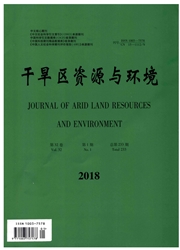

 中文摘要:
中文摘要:
Taking Gansu province as a model case,this study provides an integrated analysis on the eco-economic system of arid and semi-arid region based on emergy synthesis theory. Through calculating the values of renewable emergy flow,non-renewable resources,imported emergy,exported emergy,waste emergy,and total emergy during the period of 1978-2007,the performance of Gansu eco-economic system was analyzed. The results indicated that the renewable emergy flow within the province basically remained steady state which was estimated at 2.99×1022 solar emjoules (sej) from 1978 to 2007. The imported emergy and exported emergy were estimated at 3.75×1017 sej and 2.99×1020 sej in 1978 and increased to 1.07×1022 sej and 1.44×1022 sej respectively in 2007. The nonrenewable emergy flow was estimated at 1.62×1022 sej and increased to 1.85×1023 sej,with annual growth rate of 8.7%,while the estimated total emergy was 4.58×1022 sej in 1978 and increased to 2.11×1023 sej in 2007,with annual growth rate of 5.41%. Our results indicate a deteriorate situation between economic development and environmental protection in the region. The rapid economic growth in the past thirty years was based on a great consumption of nonrenewable resource and caused continuous decrease in the capacity of sustainable development. The environmental loading ratio was 0.53 in 1978,increased to 6.06 in 2007,indicating a rapid degradation of the regional environment quality. We calculated that the actual population was 1.53 times the renewable resource population in 1978,increased to 7.06 times in 2007. During the period of 1978-2007,the emergy rose from 2.45×1015 sej/(capita·a) to 8.07×1015 sej/(capita·a). Our analysis revealed that the emergy density presented a trend of gradual increase,and then the emergy currency ratio in Gansu decreased from 7.08×1013 sej/Chinese Yuan to 7.82×1012 sej/Chinese Yuan.
 英文摘要:
英文摘要:
Taking Gansu province as a model case,this study provides an integrated analysis on the eco-economic system of arid and semi-arid region based on emergy synthesis theory. Through calculating the values of renewable emergy flow,non-renewable resources,imported emergy,exported emergy,waste emergy,and total emergy during the period of 1978-2007,the performance of Gansu eco-economic system was analyzed. The results indicated that the renewable emergy flow within the province basically remained steady state which was estimated at 2.99×1022 solar emjoules (sej) from 1978 to 2007. The imported emergy and exported emergy were estimated at 3.75×1017 sej and 2.99×1020 sej in 1978 and increased to 1.07×1022 sej and 1.44×1022 sej respectively in 2007. The nonrenewable emergy flow was estimated at 1.62×1022 sej and increased to 1.85×1023 sej,with annual growth rate of 8.7%,while the estimated total emergy was 4.58×1022 sej in 1978 and increased to 2.11×1023 sej in 2007,with annual growth rate of 5.41%. Our results indicate a deteriorate situation between economic development and environmental protection in the region. The rapid economic growth in the past thirty years was based on a great consumption of nonrenewable resource and caused continuous decrease in the capacity of sustainable development. The environmental loading ratio was 0.53 in 1978,increased to 6.06 in 2007,indicating a rapid degradation of the regional environment quality. We calculated that the actual population was 1.53 times the renewable resource population in 1978,increased to 7.06 times in 2007. During the period of 1978-2007,the emergy rose from 2.45×1015 sej/(capita·a) to 8.07×1015 sej/(capita·a). Our analysis revealed that the emergy density presented a trend of gradual increase,and then the emergy currency ratio in Gansu decreased from 7.08×1013 sej/Chinese Yuan to 7.82×1012 sej/Chinese Yuan.
 同期刊论文项目
同期刊论文项目
 同项目期刊论文
同项目期刊论文
 Survey of officials' awareness on circular economy development in China: Based on municipal and coun
Survey of officials' awareness on circular economy development in China: Based on municipal and coun Emergy-based study on eco-economic system of arid and semi-arid region: a case of Gansu province, Ch
Emergy-based study on eco-economic system of arid and semi-arid region: a case of Gansu province, Ch Industrial Structure Evolution and Economic Growth in Dingxi City Based on Shift-Share Method and Lo
Industrial Structure Evolution and Economic Growth in Dingxi City Based on Shift-Share Method and Lo 期刊信息
期刊信息
